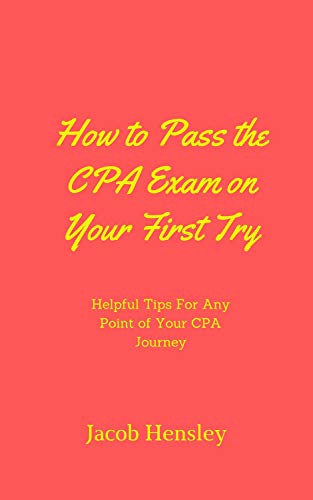
In Vermont, it is possible to become a CPA by completing the Uniform CPA Exam. Non-resident CPAs must sit for the exam, and continue professional education every 2 years. CPAs can join the American Institute of CPAs, (AICPA), for education and networking opportunities. For members of the Vermont Society of Certified Public Accountants, (VSCPA), there are also professional development opportunities.
CPA certification in Vermont is only possible with work experience
Vermont Board of Public Accountancy requires CPAs to have a certain amount of experience before they can become licensed. This usually means that you will need to have at least 200 hours of experience in auditing or attesting. This experience can be obtained from either private or public accounting. But, the experience must be supervised only by a CPA.
In order to become a CPA in Vermont, you must have the right education and experience. Not only will you need to pass your CPA exam but you'll also need to complete continuing education every 2 years. The American Institute of CPAs offers numerous educational programs, as does the Vermont Society of Certified Public Accountants.

Exam fees
Vermont's CPA exam has many moving parts. For first-timers it can be overwhelming. CPA licensure requires passing all four sections of exam with a score above 75. There are many types of CPA licenses.
You must hold a bachelor's degree in accounting or business to become a CPA for Vermont. Next, you will need to complete either 150 hours or 120 semesters of coursework. 42 hours must be in accounting or auditing.
Experience in the workplace is required for the Uniform CPA Exam
A work experience in accounting is necessary if you wish to be a CPA for Vermont. A bachelor's degree is required in accounting. This work experience is available in two ways. Either you apply for an assessment or to the CPA Central web site. Both require that you pay an application fee.
Different states have different requirements regarding work experience. Some require a minimum amount of experience in public accounting. Most allow you to work at a non-public company or in an educational institution. You can also work part-time in certain states or be self-employed. It is best to verify with your state's accounting board to determine if you qualify.

Requirements in Vermont to renew a CPA License
In order to maintain your CPA license in Vermont, you must complete continuing education requirements every two years. Non-residents of Vermont must take the exam and attend a continuing education class at the American Institute of CPAs. CPAs will find a wide range of professional learning opportunities at the American Institute of CPAs. To pursue professional development opportunities, you can join the Vermont Society of Certified Public Accountants.
For Vermont to renew your CPA license, you will need to have completed at least four hours of continuing educational credits in ethics. You also need eight hours of CPE for accounting and auditing. Also, you must complete an online renewal application. For your license to be renewed, your renewal application must be submitted before the renewal deadline.
FAQ
What are the differences between different bookkeeping systems?
There are three types of bookkeeping systems available: computerized, manual and hybrid.
Manual bookkeeping refers to the use of pen & paper to record records. This method requires attention to every detail.
Software programs can be used to manage finances through computerized bookkeeping. This saves time, effort, and money.
Hybrid bookkeeping uses both manual and computerized methods.
What is reconciliation?
This is important as you never know when errors might occur. Mistakes include incorrect entries, missing entries, duplicate entries, etc.
These problems can have grave consequences, including incorrect financial statements or missed deadlines, overspending and bankruptcy.
What does an auditor do exactly?
Auditors look for inconsistencies in financial statements and actual events.
He confirms the accuracy and completeness of the information provided by the company.
He also verifies the validity of the company's financial statements.
What is the difference in Chartered Accountant and a CPA?
Chartered accountants are professionals who have successfully passed the examinations required to be designated. A chartered accountant is usually more experienced than a CPA.
Chartered accountants can also offer advice on tax matters.
The average time to complete a chartered accountancy program is 6-8 years.
Statistics
- The U.S. Bureau of Labor Statistics (BLS) projects an additional 96,000 positions for accountants and auditors between 2020 and 2030, representing job growth of 7%. (onlinemasters.ohio.edu)
- In fact, a TD Bank survey polled over 500 U.S. small business owners discovered that bookkeeping is their most hated, with the next most hated task falling a whopping 24% behind. (kpmgspark.com)
- Given that over 40% of people in this career field have earned a bachelor's degree, we're listing a bachelor's degree in accounting as step one so you can be competitive in the job market. (yourfreecareertest.com)
- "Durham Technical Community College reported that the most difficult part of their job was not maintaining financial records, which accounted for 50 percent of their time. (kpmgspark.com)
- According to the BLS, accounting and auditing professionals reported a 2020 median annual salary of $73,560, which is nearly double that of the national average earnings for all workers.1 (rasmussen.edu)
External Links
How To
How to get a Accounting degree
Accounting is the process of keeping track of financial transactions. It can be used to record transactions between individuals and businesses. Bookkeeping records are also included under the term "account". These data are used by accountants to create reports that help companies or organizations make decisions.
There are two types accounting: managerial and general accounting. General accounting involves the reporting and measurement business performance. Management accounting is concerned with measuring, analysing, and managing organizations' resources.
An accounting bachelor's degree prepares students for entry-level positions as accountants. Graduates might also be able to choose to specialize, such as in auditing, taxation, finance or management.
Accounting is a career that requires a solid understanding of economic concepts like supply and demand and cost-benefit analysis. Marginal utility theory, consumer behavior, price elasticity of demand and law of one price are all important. They should also be able to understand macroeconomics, microeconomics and accounting principles as well as various accounting software packages.
Students interested in pursuing a Master's degree in accounting must have passed at least six semesters of college courses, including Microeconomic Theory; Macroeconomic Theory; International Trade; Business Economics; Financial Management; Auditing Principles & Procedures; Accounting Information Systems; Cost Analysis; Taxation; Managerial Accounting; Human Resource Management; Finance & Banking; Statistics; Mathematics; Computer Applications; and English Language Skills. Graduate Level Examinations are required for all students. This examination is normally taken after students have completed three years of education.
For certification as public accountants, candidates must have completed four years of undergraduate and four year of postgraduate education. Candidates must then take additional exams before they can apply for registration.